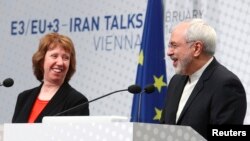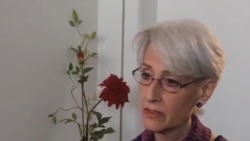Iran and six world powers have ended what were described as three days of "productive" nuclear talks aimed at setting the agenda for further negotiations on a comprehensive deal on Tehran's nuclear program.
European Union foreign policy chief Catherine Ashton said the next round of talks will begin on March 17 in Vienna.
Ashton said Thursday the talks were off to "a good start" and the latest round of meetings had been "productive." She plans to visit Tehran for two days starting March 9.
Iran's Foreign Minister Mohammad Javad Zarif described the talks as positive, but said his country would not allow a nuclear solution to be imposed on Iran.
"Our [nuclear] program will continue. We will not close down any sites and we have formally declared it," he said.
Iranian state media reported Thursday the two sides have agreed on a framework for talks on a comprehensive deal. Senior Iranian negotiator Abbas Araghchi did not lay out the specifics of the negotiating agreement in his comments to the IRNA news agency.
The two sides are trying to build on a six-month deal they reached in November that calls for Iran to cut back its most sensitive nuclear activity in exchange for limited sanctions relief.
The group that includes the United States, Britain, China, France, Russia and Germany wants Iran to provide assurances it will not develop nuclear weapons. In return, Iran wants all the sanctions that have hurt its economy to be lifted.
Iran has long insisted that its nuclear program is peaceful.
VOA Persian News Network on-camera interview from Vienna with U.S. Undersecretary of State Wendy Sherman, speaking about the latest round of Iran Nuclear talks.
European Union foreign policy chief Catherine Ashton said the next round of talks will begin on March 17 in Vienna.
Ashton said Thursday the talks were off to "a good start" and the latest round of meetings had been "productive." She plans to visit Tehran for two days starting March 9.
Iran's Foreign Minister Mohammad Javad Zarif described the talks as positive, but said his country would not allow a nuclear solution to be imposed on Iran.
"Our [nuclear] program will continue. We will not close down any sites and we have formally declared it," he said.
Iranian state media reported Thursday the two sides have agreed on a framework for talks on a comprehensive deal. Senior Iranian negotiator Abbas Araghchi did not lay out the specifics of the negotiating agreement in his comments to the IRNA news agency.
The two sides are trying to build on a six-month deal they reached in November that calls for Iran to cut back its most sensitive nuclear activity in exchange for limited sanctions relief.
The group that includes the United States, Britain, China, France, Russia and Germany wants Iran to provide assurances it will not develop nuclear weapons. In return, Iran wants all the sanctions that have hurt its economy to be lifted.
Iran has long insisted that its nuclear program is peaceful.
VOA Persian News Network on-camera interview from Vienna with U.S. Undersecretary of State Wendy Sherman, speaking about the latest round of Iran Nuclear talks.







